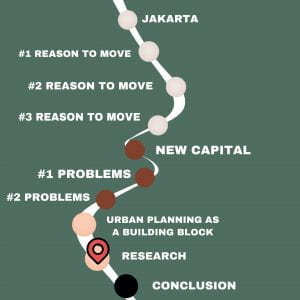Hi Everyone! We’ve come to my 2nd last blog post ): I can’t believe my blogging journey is ending soon! Today we are going to discuss about urban planning in Indonesia from the perspective of one of the urban planner in Indonesia.

I conducted an interview with Thasya Aliya ( Sya ), my friend who is an urban planner in Research and Development Planning Agency ( Badan Perencanaan Penelitian dan Pengembangan ) in Batam. From my interview with her, I realised how Indonesia is actually already quite equipped with relevant knowledge and technologies. For example, they are trained to analyse the statistics and utilise arcGIS. The urban planner team in Indonesia also have a short term and long term plan for the town planning and mapping. In Sya’s opinion, the relocation of capital is too rushed and forced. It is because before the relocation itself, the government should conduct a thorough survey that is conducted periodically. They should consider the resources, the final concept, and the trade off with the forest protection and endemic endangered species, which is crucial in preventing a “biodiversity catastrophe” . For her, the town planning for the future capital of Indonesia should includes these things :
- Integration of green spaces in land use
- Rules and regulation ( especially in terms of conservation )
- Socio-demographic analysis ( culture )
- Economy and job creation
- Services ( healthcare, trade, education, culture ) & Infrastructure ( drainage, waste management, water, communication, electricity, transportation, housings )
She mentioned how urban planning is crucial as a building block of a city and therefore the government should not overlook it! She also brought a point about the most recent and controversial bill called the “Omnibus Law” in Indonesia ( which caused a massive riot in Jakarta, by the way). Other than the controversies in the economic sector, the bill also cause controversies in the economic sector since it might cause higher rate of deforestation due to the decrease in protection of these forests. This got me thinking if actually the government is serious about conserving primary forests and stopping deforestation in the new capital if they cannot even implement and enforce strict regulations that protect the environment in the current cities. Who knows, that maybe in the next 100 years, this new capital will be the new ‘disposable city’ .

Perhaps, there is a greater need to bring about this conversation to locals, about the importance of conservation and prioritising the environment in every decision making processes. There is also the urge into galvanising the locals into “becoming” an environmentalist ( Thank you, Dr Coleman for the interesting article! (: ) who favours sustainability and who hopefully can press for a change in Indonesia.
Alright, I can’t to wait see you next week for the last post for my whole blogging journey (:
Hey Sherry
Really cool that your friend is in the position to give such an insightful response! It is interesting but also very concerning that you mentioned the possibility of the new capital being a “disposable city”, I was wondering as Jakarta has been the capital for roughly 60 years, how long do you think the new capital might last before it has to be replaced again? Also since you mentioned people like your friend who are against the relocation, is there anything being done to prevent this change or delay it, and if so why has it not been effective.
Looking forward to hearing from you!
Mark 🙂
Hi Mark!
Thank you for your comment! I have no idea when will the new capital reach its maximum capacity and “need to be replaced again” but the idea behind the relocation is for Indonesia to move there once and for all so that they do not need to relocate again since the new capital will be sustainable. For your second question, the pandemic is actually delaying it and it has been effective in doing so since the pandemic took so much resources from the reserve. Other than that, perhaps there is the need for environmental groups to pressure the government to prevent or delay this. Thank you
Cheers
Sher